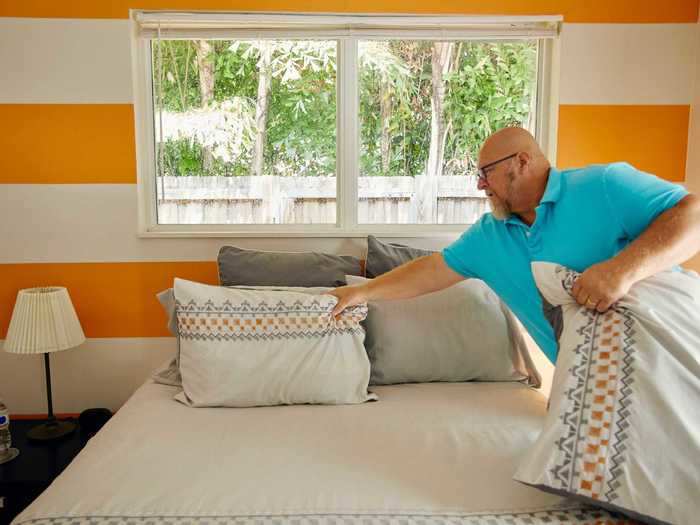
Airbnb CEO Brian Chesky.Dia Dipasupil/Getty Images
After over 12 years in business, Airbnb is finally going public.
The home-rental company filed a form S-1 for its IPO with the Securities and Exchange Commission on Monday afternoon. That included disclosing a trove of information that was previously unknown. For starters: Airbnb is over $2 billion in debt.
But that's far from all the filing document has to offer — a section labeled "Risk Factors" details the major issues Airbnb believes it could face. We break down the most important of those potential issues below:

With millions of people around the world staying home throughout 2020 as the coronavirus pandemic spread from country to country, Airbnb rentals dropped off a cliff.
The company took drastic measures to stem the bleeding: It cut its full-time workforce by a quarter (about 1,800 employees), cut marketing spend, and reduced costs overall.
"The COVID-19 pandemic and the impact of actions to mitigate the COVID-19 pandemic have materially adversely impacted and will continue to materially adversely impact our business, results of operations, and financial condition," the company said in the first of many risk factors listed in the S-1.

Airbnb enjoyed a meteoric rise in popularity, and it's unlikely to return to those levels of growth anytime soon.
"We have experienced significant revenue growth in the past," the company said. "However, our revenue growth has slowed in recent periods and there is no assurance that historic growth rates will return."
For the last three years, revenue growth has declined steadily, and it fell sharply in the first nine months of 2020.

Like Uber and other app-based startups that have exploded in popularity across the last decade, Airbnb has tangled with legislators and locals over how it does business.
"Since we began our operations in 2008, there have been and continue to be legal and regulatory developments that affect the short-term rental and home sharing business," the filing says. "While we seek to work with governments, we have in the past, and are likely in the future to, become involved in disputes with government agencies regarding such laws and regulations."
In some cases, like New York City, Airbnb says those regulations could result in a loss of revenue. In many cases, though, the laws simply do not exist yet to regulate short-term home rentals, and that means unknown risks.

With a revenue of $2.52 billion and a net loss of $696.9 million for the first nine months of 2020, Airbnb isn't exactly stacking up a war chest. In fact, it's got just shy of $2 billion of principal on debts, and it's not totally certain it'll be able to pay interest and principal in the future.
"If we experience a decline in cash flow due to any of the factors described in these 'Risk Factors' or otherwise, we could have difficulty paying interest and the principal amount of our outstanding indebtedness," the filing says. "If we are unable to generate sufficient cash flow or otherwise obtain the funds necessary to make required payments under our Credit Agreements, or if we fail to comply with the various requirements of our indebtedness, we could default under our Credit Agreements."

For Airbnb, the focus has always been on user acquisition and growth. That focus has come at the expense of becoming profitable, and there's no assurance that a solution to that issue is coming.
"We have incurred net losses in each year since inception, and we may not be able to achieve profitability," the filing says. "We incurred net losses of $70.0 million, $16.9 million, $674.3 million, and $696.9 million for the years ended December 31, 2017, 2018, and 2019, and nine months ended September 30, 2020, respectively. Our accumulated deficit was $1.4 billion and $2.1 billion as of December 31, 2019 and September 30, 2020, respectively."
This has been particularly worsened by the pandemic.
"In particular, we expect the ongoing economic impact from the COVID-19 pandemic to have a material adverse impact on our revenue and financial results for 2020 and beyond. While we have enacted measures to reduce our expenses, we expect to incur a significant net loss for 2020 as a result of the COVID-19 pandemic, and we are utilizing a significant portion of our cash to support our operations in 2020 resulting from a material decrease in bookings and revenue as compared to 2019."
If you're interested in reading the full IPO filing, you can find it right here.
Got a tip? Contact Business Insider senior correspondent Ben Gilbert via email (bgilbert@businessinsider.com), or Twitter DM (@realbengilbert). We can keep sources anonymous. Use a non-work device to reach out. PR pitches by email only, please.
 Stock markets stage strong rebound after 4 days of slump; Sensex rallies 599 pts
Stock markets stage strong rebound after 4 days of slump; Sensex rallies 599 pts
 Sustainable Transportation Alternatives
Sustainable Transportation Alternatives
 10 Foods you should avoid eating when in stress
10 Foods you should avoid eating when in stress

Copyright © 2024. Times Internet Limited. All rights reserved.For reprint rights. Times Syndication Service.